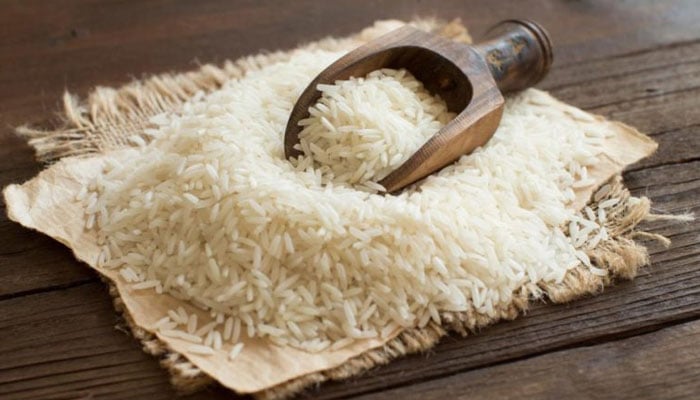Pakistan’s basmati rice exports surge, India’s fall
MUMBAI: India's basmati rice exports are likely to fall in 2024 after nearing a record high last year, as rival Pakistan is offering the grain at competitive prices amid a rebound in production, industry officials said.
India and Pakistan are the leading exporters of the premium long-grain variety of rice, famous for its aroma, to countries such as Iran, Iraq, Yemen, Saudi Arabia, the United Arab Emirates, and the United States.
India's exports of basmati rice surged 11.5 percent from a year earlier to 4.9 million metric tonnes in 2023, just shy of the record high of 5 million tonnes hit in 2020, on lower supplies from Pakistan and stocking efforts by importing countries, industry officials said.
Basmati rice shipments helped the world's biggest rice exporter to garner a record $5.4 billion in 2023, up nearly 21 percent from the previous year, because of higher prices, government data showed.
"Last year, buyers were hustling to stock up when Pakistan was facing production issues. This year, however, Pakistan offers lower prices than India due to increased production," Vijay Setia, a leading exporter based in Haryana state of India, said.
Islamabad's total rice exports could jump to 5 million tonnes in 2023/24 financial year, up from the last year's 3.7 million tonnes, Chela Ram Kewlani, chairman of Rice Exporters Association of Pakistan (REAP) said last month.
The depreciation of the Pakistani rupee has made Pakistan's exports more competitive, according to Akshay Gupta, head of bulk exports at KRBL Ltd. Meanwhile, lower export demand amid an estimated 10 percent rise in India's basmati rice production has started pulling down basmati prices in that country, said Gupta.
Iran, the biggest buyer of Indian basmati rice, slashed purchases by 36 percent in 2023, but higher shipments to Iraq, Oman, Qatar, and Saudi Arabia offset the shortfall, according to data compiled by India's Ministry of Commerce and Industry.
Indian exports had lost momentum in September and October as the government imposed minimum export price (MEP) on basmati rice, but they quickly recovered, said a New-Delhi-based exporter.
In August, India imposed the MEP on basmati rice shipments at $1,200 per tonnes, exceeding prevailing market rates, before lowering it to $950 in October. However, exports began faltering again in January, and may decline further in the near term as buyers delay purchases due to increased freight costs caused by disruptions in shipping via the Red Sea, exporter Vijay Setia said. "Buyers are holding ample inventory; there's no need for them to rush," he said.
-
 Iran Tensions Rise As Trump Says He Is 'not Thrilled' With Nuclear Negotiations
Iran Tensions Rise As Trump Says He Is 'not Thrilled' With Nuclear Negotiations -
 Where Is Calvin Klein's Wife Kelly Klein Now After Divorce And Fashion Fame?
Where Is Calvin Klein's Wife Kelly Klein Now After Divorce And Fashion Fame? -
 Kourtney Kardashian’s Role As Stepmother Questioned
Kourtney Kardashian’s Role As Stepmother Questioned -
 Neil Sedaka Dies At 86 After Hospitalisation In Los Angeles
Neil Sedaka Dies At 86 After Hospitalisation In Los Angeles -
 'Lizzie McGuire' Star Robert Carradine's Reason Of Death Laid Bare
'Lizzie McGuire' Star Robert Carradine's Reason Of Death Laid Bare -
 Lisa Rinna Breaks Silence After Recent Reunion With Andy Cohen: 'I've Pissed Him Off'
Lisa Rinna Breaks Silence After Recent Reunion With Andy Cohen: 'I've Pissed Him Off' -
 Savannah Guthrie Mom Update: Unexpected Visitors Spark Mystery Outside Nancy's Home
Savannah Guthrie Mom Update: Unexpected Visitors Spark Mystery Outside Nancy's Home -
 Elle Fanning Shares Detail About Upcoming Oscars Night Plan With Surprise Date
Elle Fanning Shares Detail About Upcoming Oscars Night Plan With Surprise Date -
 Demi Lovato Spills Go-to Trick To Beat Social Anxiety At Parties
Demi Lovato Spills Go-to Trick To Beat Social Anxiety At Parties -
 Benny Blanco Looks Back At The Time Selena Gomez Lost Her Handrwritten Vows Days Before Wedding
Benny Blanco Looks Back At The Time Selena Gomez Lost Her Handrwritten Vows Days Before Wedding -
 Naomi Watts Reveals Why She Won't Get A Facelift In Her 50s
Naomi Watts Reveals Why She Won't Get A Facelift In Her 50s -
 Travis Kelce's Mom Donna Fires Back At Critic With Sarcastic Reply After Body Jab
Travis Kelce's Mom Donna Fires Back At Critic With Sarcastic Reply After Body Jab -
 Kendall Jenner Gets Candid About Her Differences With The Kardashian Clan Over Style Choices
Kendall Jenner Gets Candid About Her Differences With The Kardashian Clan Over Style Choices -
 Sam Altman Opens Up About OpenAI, Anthropic, Pentagon Conflict
Sam Altman Opens Up About OpenAI, Anthropic, Pentagon Conflict -
 Brenda Song Confesses Fascination With Conspiracy Theories
Brenda Song Confesses Fascination With Conspiracy Theories -
 Lunar Eclipse 2026: Time, Date, Sighting Locations, Know Every Detail
Lunar Eclipse 2026: Time, Date, Sighting Locations, Know Every Detail




